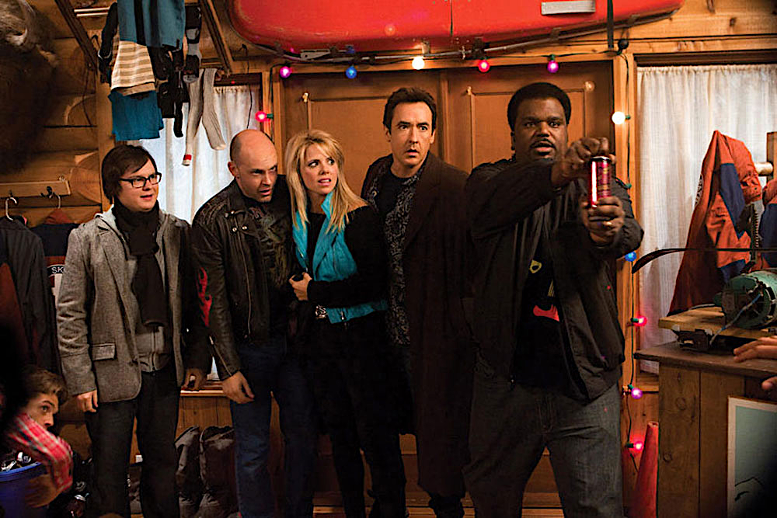Present Tense, Past Better
Hot Tub Time Machine
2010 Director: Steve Pink
Starring: John Cusack, Rob Corddry, Craig Robinson, Clark Duke, Chevy Chase
Four guys go on a ski trip in this comedy. Three of them, who were friends when they were younger, are in a rut. Things were better in the past, they realize, and now they are simply suffering the present. These men did nothing with their lives: Adam (Cusack), an insurance agent, endures a painful breakup; Nick (Robinson), a promising musician, now grooms dogs; Lou (Corddry) is an obnoxious alcoholic who perhaps attempted suicide; and Adam’s nephew, Jacob (Duke), lives in his uncle’s basement playing video games.
Adam and Nick visit Lou in the hospital and offer him a return trip to Kodiak Valley, a ski resort. In their youth, they had lots of fun there, and they now try to reconnect and make sense of the present. At the inn, they get the same room they had in the past but everything—like themselves—has really gone downhill. The hot tub, which wasn’t working, is suddenly functional. And its steaming, swirling water and its golden glow beacon the men toward it. They quickly undress, enter it, and drink alcohol with wild abandon.
They awaken the next morning, still in the hot tub, in a snowy landscape, and decide they should ski. They recklessly descend the mountain and crash down a ravine, but they are unhurt. At the ski lodge, something’s amiss, but they can’t quite figure out why. They finally realize that they have travelled back in time to 1986. They don’t understand how this happened or why. But this is confirmed when they see their younger selves in the mirror. Jacob, however, is simply himself in the reflection: he has not been born yet.
As the guys try to figure out what they are doing, they recall the plots of other time-travel films, as a way to guide themselves through the process. Nick worries that if they run into themselves they might blow up or explode as in “Timecop.” He then reasons that time is cyclical, “like in ‘The Terminator’; the machines send Schwarzenegger back to kill Sarah Connor. . . .” Adam mentions that they must avoid changing the past as in “The Butterfly Effect.” Humorously, Jacob’s image flickers in the mirror, as in “Back to the Future.”
Suddenly, a repairman (Chase) appears and tells the group that they “fried the timing crossover” in the hot tub. The men are startled to see him and ask if someone called him. His retort, “who ever calls us?,” is the first of his cryptic explanations and double-entendres. Eventually, Jacob asks him rhetorically, “would it kill you to give me a straight answer?”
Apparently, in their drinking at the hot tub, they spilled an energy drink onto the control board, shorting out its circuit. The guys eventually figure out that in they want to keep the present intact by ensuring that they don’t change the past, but this becomes difficult for them. Adam, for instance, is supposed to break up with his girlfriend in 1986, but is having second thoughts about it now that he idealizes her.
The men are committed to ensuring that they don’t change the past to keep the present intact. One might ask, why do this if the present is mediocre? Why not learn from the past to make the present better? And does all of the past need to be exactly as it was or just some of it? Is destiny real or can we change it? And also, were things really better in the past? Or is it just an illusion? It seems they idealized something that wasn’t really all that great, from what we see. The movie questions how one measures the present against the past, which is highly valid. And unlike many bromance films, it seeks important existential answers to life’s questions.


